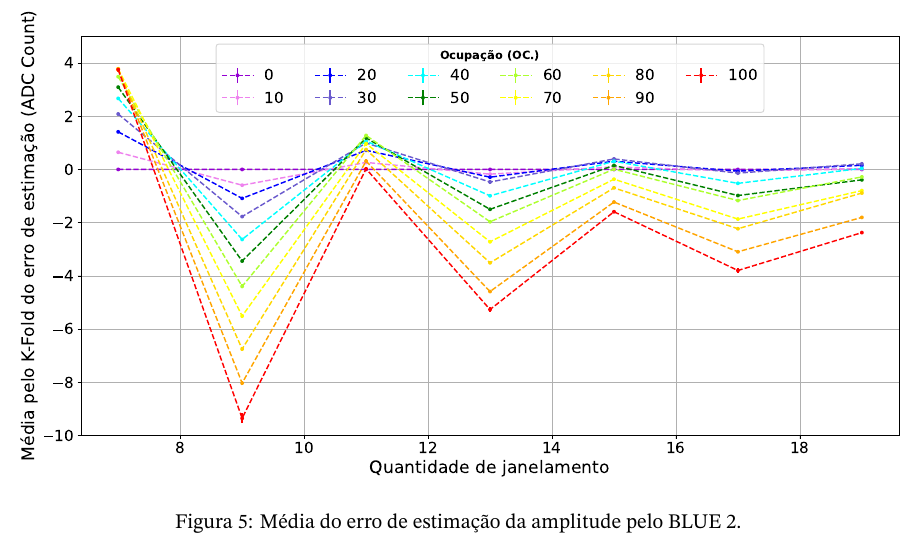Signal deconvolution for energy estimation in calorimetry system operating at high event rate
DOI:
https://doi.org/10.14295/vetor.v34i2.18340Keywords:
Signal reconstruction, Amplitude estimation, Signal deconvolution, High Luminosity, Experimental high energy physicsAbstract
This article aims to evaluate the performance of a method based on Signal Deconvolution for energy estimation in high-energy calorimeters. The study focuses on reconstructing signals produced by the readout channels of a calorimetry system resulting from atomic particle collisions. Data processing is performed in a continuous or sequential format (free-running), aligned with the operation of modern experiments characterized by high event rates and high luminosity. This context enables determining the optimal sample processing interval to enhance the efficiency of signal reconstruction by the readout channels. Additionally, the K-Fold cross-validation technique is employed for statistical error analysis. The study compares the efficiency of the proposed method with the linear technique currently used in modern calorimeters under different operating conditions. The findings identified the optimal intervals for the methods in amplitude estimation and highlighted the independence of the Deconvolution method from signal pile-up, making it advantageous in high-luminosity environments.Downloads
References
N. Nebeker, “Fifty years of signal processing: The IEEE signal processing society and its technologies 1948-1998,” The IEEE Signal Processing Society, vol. 20, 1998. Disponível em: https://signalprocessingsociety.org/uploads/history/history.pdf
A. Lopes e M. L. Perrey, “Faq-lhc the guide,” CERN, Genève , Switzerland, Relatório técnico 1, 2022. Disponível em: https://cds.cern.ch/record/2255762/files/CERN-Brochure-2017-002-Eng.pdf
A. Rassat e M. Cirilli. (2017) From the web to a start-up near you. Página online CERN Courier. Disponível em: https://cerncourier.com/a/from-the-web-to-a-start-up-near-you/
P. L. Rocca e F. Riggi, “The upgrade programme of the major experiments at the large hadron collider,” Journal of Physics: Conference Series, vol. 515, no. 1, p. 012012, 2014. Disponível em: https://dx.doi.org/10.1088/1742-6596/515/1/012012
The ATLAS Collaboration, “The atlas experiment at the cern large hadron collider,” Journal of Instrumentation, vol. 3, no. 08, p. S08003, 2008. Disponível em: https://dx.doi.org/10.1088/1748-0221/3/08/S08003
S. de Miranda Rimes, B. S.-M. Peralva, L. M. de Andrade Filho, e J. M. de Seixas, “Qualidade de dados baseada em probabilidades para reconstrução da energia em calorimetria de altas energias,” The Journal of Engineering and Exact Sciences, vol. 9, no. 10, pp. 17 808–17 808, 2023. Disponível em: https://doi.org/10.18540/jcecvl9iss10pp17808
G. I. Gonçalves, B. S.-M. Peralva, J. M. de Seixas, L. M. de Andrade Filho, e A. S. Cerqueira, “Performance of optimal linear filtering methods for signal estimation in high-energy calorimetry,” Journal of Control, Automation and Electrical Systems, vol. 33, no. 5, pp. 1601–1611, 2022. Disponível em:https://doi.org/10.1007/s40313-022-00907-0
P. Klimek e O. behalf of the ATLAS Tile Calorimeter group, “Signal reconstruction performance with the atlas hadronic tile calorimeter,” Journal of Physics: Conference Series, vol. 404, no. 1, p. 012046, 2012. Disponível em: https://dx.doi.org/10.1088/1742-6596/404/1/012046
S. de Miranda Rimes, B. S.-M. Peralva, L. M. de Andrade Filho, e J. M. de Seixas, “Qualidade de dados baseada em probabilidades para reconstrução da energia em calorimetria de altas energias,” The Journal of Engineering and Exact Sciences, vol. 9, no. 10, pp. 17 808–17 808, 2023. Disponível em: https://doi.org/10.18540/jcecvl9iss10pp17808
ScikitLearn. (2024) Cross-validation: evaluating estimator performance. Explicação técnica da validação cruzada K-Fold por meio da biblioteca sicikit-learn. Disponível em: https://scikit-learn.org/stable/modules/cross_validation.html
A. V. Oppenheim, Discrete-time signal processing. Pearson Education India, 1999, ISBN: 0131988425.
L. M. de A. Filho, B. S. Peralva, J. M. de Seixas, e A. S. Cerqueira, “Calorimeter response deconvolution for energy estimation in high-luminosity conditions,” IEEE Transactions on Nuclear Science, vol. 62, no. 6, pp. 3265–3273, 2015. Disponível em: https://doi.org/10.1109/TNS.2015.2481714
S. d. M. Rimes, “Filtragem inversa não-linear para estimação de sinais em calorímetros operando a alta taxa de eventos,” Dissertação de mestrado, Universidade do Estado do Rio de Janeiro (UERJ), 2021. Disponível em: https://www.bdtd.uerj.br:8443/handle/1/16415
F. Szabo, The linear algebra survival guide: illustrated with Mathematica. Academic Press, 2015.
G. Morett. (2024) Repositório do método de desconvolução de sinais. GitHub. Disponível em: https://github.com/MorettGuilherme?tab=repositories
















